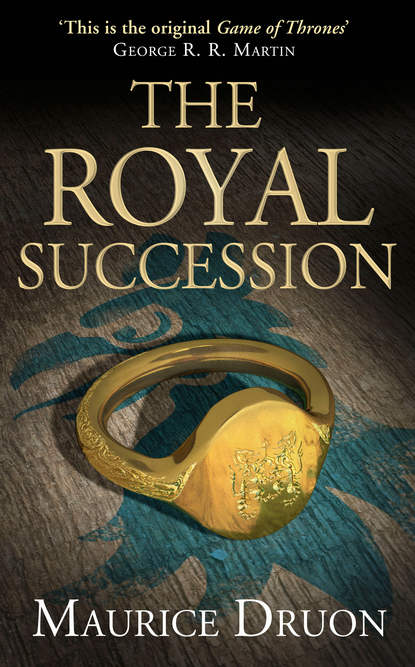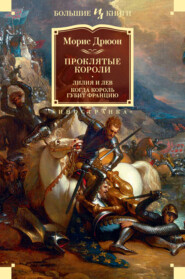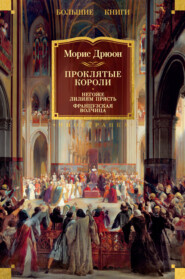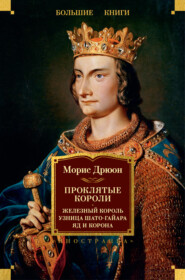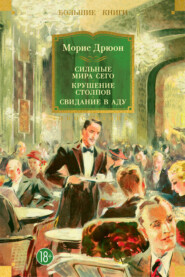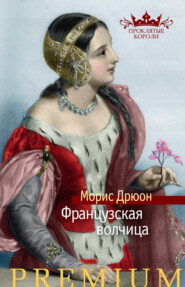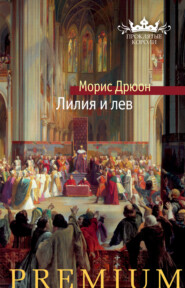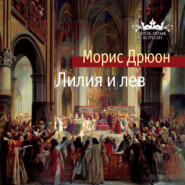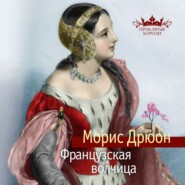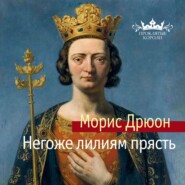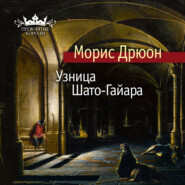По всем вопросам обращайтесь на: info@litportal.ru
(©) 2003-2024.
✖
The Royal Succession
Автор
Год написания книги
2019
Настройки чтения
Размер шрифта
Высота строк
Поля
There was unanimous indignation among his hearers. There were oaths in Italian, Provençal and French. Cardinal Duèze had fallen prostrate in a confessional, his hand to his heart, as if his years could not bear the shock, and he pretended to join in the protests with inaudible murmurs. Arnaud d’Auch, the Cardinal Camerlingo, a corpulent and sanguine prelate, advanced on the Count de Forez and said menacingly: ‘Messire, a Pope cannot be elected in such conditions, for you are violating the constitution of Gregory X, which obliges the Conclave to meet in the town in which the Pope died.’
‘You were there, Monseigneur, two years ago, and you dispersed without having made a Pope, which is also a breach of the constitution. But if, by any chance, you should wish to be taken back to Carpentras, we will conduct you there under a good escort and in closed coaches.’
‘We may not deliberate under the threat of force!’
‘That is why there are seven hundred men outside, Monseigneur, to guard you. They have been provided by the authorities of the town to ensure your protection and your isolation, as the constitution prescribes. The Sire de la Voulte here, who is a native of Lyons, is in command of them. Messire the Regent also wishes you to know that if, by the third day, you have not agreed, you will receive but one dish in the twenty-four hours by way of food and, after the ninth day, there will be but bread and water, as is also prescribed in the constitution of Gregory. And finally, if enlightenment does not come to you through fasting, he will destroy the roof and expose you to the inclemency of the weather.’
Bérenger Frédol, the elder, intervened: ‘Messire, you will be guilty of murder if you subject us to such treatment, for there are some among us who will not be able to support it. Look at Monseigneur Duèze, who has already collapsed and is in need of care.’
‘Oh, yes, oh, most certainly,’ Duèze complained feebly; ‘I shall most certainly not be able to support it.’
‘What’s the use?’ cried Caetani. ‘Can’t you see we have to do with savage and stinking beasts? But let me tell you, Messire, that instead of electing a Pope, we shall excommunicate you, you and your perjurer.’
‘If you hold a meeting of excommunication, Monseigneur Caetani,’ the Count de Forez replied calmly, ‘the Regent might make known to the Conclave the name of certain sorcerers and casters of spells who should be put at the top of the list for roasting.’
‘I really don’t see,’ said Caetani, beating a hasty retreat, ‘I really don’t see what sorcery has to do with the matter, since it’s with the election of a Pope that we are concerned.’
‘Ah, Monseigneur, I see we understand each other; please dismiss the people you do not need, because there will not be enough food to feed them all.’
The Cardinals realized that all resistance was vain and that this armed man, who was giving them the Count of Poitiers’s orders in so firm a voice, was adamant. Already, behind Jean de Forez, the men-at-arms were beginning to enter one by one, pike in hand, and to deploy at the end of the church.
‘Since we cannot use force, we shall use cunning,’ said Caetani in a low voice to the Italians. ‘Let us pretend to submit, because at the moment we can do no other.’
They each chose the three most faithful servants from among their following, those they thought might be the best advisers, the most cunning in intrigue, or the most apt at tending to their physical wants in the difficult material circumstances in which they would have to live. Caetani kept Father Bost, Andrieu and Pierre, the priest with the two thumbs, that is to say the men who had been implicated in casting the spell on Louis X; he preferred that they should be shut up with him, rather than risk their talking either for money or under torture. The Colonnas kept four pages who could fell an ox with their fists. Canons, clerks, linkmen and trainbearers began to leave, one by one, through the hedge of armed men. As they passed, their masters whispered:
‘Let my brother the Bishop know … Write in my name to my cousin de Got … Leave at once for Rome …’
At the moment when Guccio Baglioni was preparing to leave, Jacques Duèze put out his thin hand from within the confessional, where he lay in a state of collapse, and seized the young Italian by his robe, murmuring: ‘Stay with me, my boy. I am sure you will be a great help to me.’
Duèze knew from experience that the power of money was far from negligible within a Conclave; it was an unhoped-for piece of luck to have with him a representative of the Lombard banks.
An hour later there remained inside the Church of the Jacobins but ninety-six men, who were fated to stay there as long as twenty-four among them had not agreed on the election of one. Before leaving, the men-at-arms had carried in armfuls of straw to make beds, on the very stone itself, for the most powerful prelates of the world. A few basins had been brought, that they might wash themselves, and water, in great jars, had been placed at their disposal. Under the eye of the Count de Forez, the masons had walled up the last exit, merely leaving a little square opening halfway up, a window just wide enough to allow food to be passed in, but too narrow for a man to pass through. All round the church the soldiers had taken up their positions six yards apart and in two ranks: one rank with backs to the wall looked towards the town; the other faced the church and watched the windows.
Towards midday the Count of Poitiers set out for Paris. He took with him in his following the Dauphin of Viennois and the little Dauphiniet, who would henceforth live at his Court in order to get to know his five-year-old betrothed.
At the same hour the Cardinals received their first meal: since it was a fast day, they were given no meat.
6 (#ulink_13c50e0b-afbf-5ae3-9eec-980b58fdfef5)
From Neauphle to Saint-Marcel (#ulink_13c50e0b-afbf-5ae3-9eec-980b58fdfef5)
ON A MORNING EARLY in July, well before dawn, Jean de Cressay entered his sister’s room. The large young man carried a smoking candle; he had washed his beard and was wearing his best riding-cloak.
‘Get up, Marie,’ he said. ‘You’re leaving this morning. Pierre and I are going to take you.’
The girl sat up in bed.
‘Leave? What do you mean? Have I got to leave this morning?’
Her mind was still hazy from sleep and she stared in incomprehension at her brother out of her huge dark blue eyes. She automatically shook back over her shoulders her long thick, silky hair, in which there were golden lights.
Jean de Cressay looked at his sister’s beauty without pleasure, as if it were a sin.
‘Pack up your clothes, for you won’t be coming back for a long time.’
‘But where are you taking me?’ asked Marie.
‘You’ll see.’
‘But why did you not say anything about it yesterday?’
‘What, so that you might still have time to play another trick on us? Come on, hurry up; I want to get started before our serfs see us. You’ve brought us shame enough; there’s no point in giving them more cause for gossip.’
Marie did not reply. For the last month her family had treated her like this and spoken to her in this tone of voice. She got up, feeling the weight of her five months’ pregnancy which, though still light, always surprised her when she rose in the morning. By the light of the candle Jean had left her, she made ready, washed her face and neck and quickly tied up her hair; she noticed that her hands were trembling. Where were they taking her? To what convent? She placed about her neck the gold reliquary Guccio had given her, which had come, so he had said, from Queen Clémence. ‘Up to now the relics have not been much protection,’ she thought. ‘Have I not prayed to them enough?’ She packed an overdress, a few underdresses, a surcoat and some towels for washing.
‘You’ll wear your cloak with the big hood,’ Jean said, as he looked into her room for a moment.
‘But I shall die of heat!’ said Marie. ‘It’s a winter cloak.’
‘Your mother wishes you to travel with your face hidden. Do as you’re told and hurry.’
In the courtyard the second brother, Pierre, was saddling the two horses himself.
Marie had known that this day was bound to come; in one way, however sad she felt at heart, she was not altogether sorry; at moments she had even looked forward to this departure. The most austere of convents would be more tolerable than the constant complaints and reproaches to which she had been subjected. At least she would be alone with her misfortune. She would no longer have to bear the anger of her mother, who had been bedridden from a stroke ever since the scandal had broken, and who cursed her daughter every time Marie brought her an infusion of herbs. They had had to summon urgently the surgeon-barber of Neauphle to draw a pint of dark blood from the stout lady of the manor. Dame Eliabel had been bled six times in less than a fortnight, but the treatment did not appear to be accelerating her return to health.
Marie was treated by her two brothers, particularly by Jean, as a criminal. Oh, rather the cloister a thousand times over! But would she ever be able to get news of Guccio in the convent? That was her obsession, her greatest fear at the fate awaiting her. Her wicked brothers had told her that Guccio had fled abroad.
‘They don’t want to admit it,’ she thought, ‘but they have had him put in prison. It’s not possible, simply not possible, that he has deserted me! Or perhaps he has returned to the country to save me; and that is why they are in such a hurry to take me away; and then they’ll kill him. Why did I not agree to go away with him? I refused to listen to him so as not to wound my mother and my brothers, and now the worst has befallen me as a result of trying to do right.’
Her imagination conjured up every possible form of disaster. There were moments when she even hoped that Guccio had really fled, leaving her to her fate. With no one from whom to ask advice or even compassion, she had no company but her unborn child; but that life was not yet of much help to her, except for the courage with which it inspired her.
At the moment of leaving, Marie de Cressay asked if she could say goodbye to her mother. Pierre went up to Dame Eliabel’s room, but there issued from it such a shouting on the part of the widow, whose voice appeared but little affected by the bleedings, that Marie realized it was useless. Pierre came down again, his face sad, his hands spread wide in a gesture of impotence.
‘She said that she no longer had a daughter,’ he said.
And Marie thought once again: ‘I should have done better to run away with Guccio. It’s all my fault. I should have gone with him.’
The two brothers mounted their horses and Jean de Cressay took his sister up on the crupper, because his horse was the better of the two, or rather the less bad. Pierre was riding the broken-winded nag, whose nostrils made a roaring sound, and on which, the previous month, the two brothers had made so distinguished an entry into the capital.
Marie cast a final glance at the little manor she had never left since she was born and which now, in the half-light of the uncertain dawn, already seemed to be clothed in a grey mist of memory. Every moment of her life, since she had first opened her eyes, was contained within these walls and in this countryside: her childish games, the surprising daily discovery of herself and of the world, which every human being makes in his turn, the infinite diversity of plants in the fields, the strange shapes of flowers, the marvellous pollen in their hearts, the softness of the down on young ducks’ breasts and the play of sunlight on dragonflies’ wings. She was leaving all those hours she had spent in watching herself grow, listening to her dreams, every stage of her changing face that she had so often admired in the clear waters of the Mauldre, and also that great joy at being alive she had sometimes felt when she lay full length on her back in the middle of a field, looking for omens in the shapes of the clouds and imagining God in the depths of the sky. She passed by the chapel, where her father lay beneath a stone flag and where the Italian monk had married her secretly to Guccio.
‘Lower your hood,’ her brother Jean ordered.
As soon as they had crossed the river, he hastened his horse’s pace, and Pierre’s began roaring at once.
‘Jean, aren’t we going rather too fast?’ said Pierre, indicating Marie with a jerk of the head.
‘To hell with it! Bad seed’s always solidly sown,’ replied the elder, as if he hoped wickedly for an accident.





